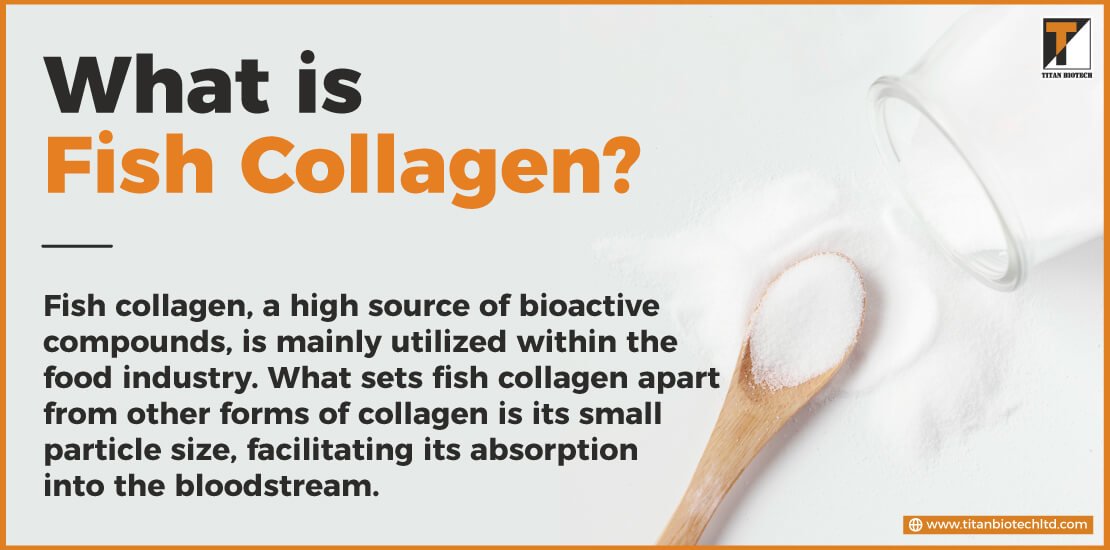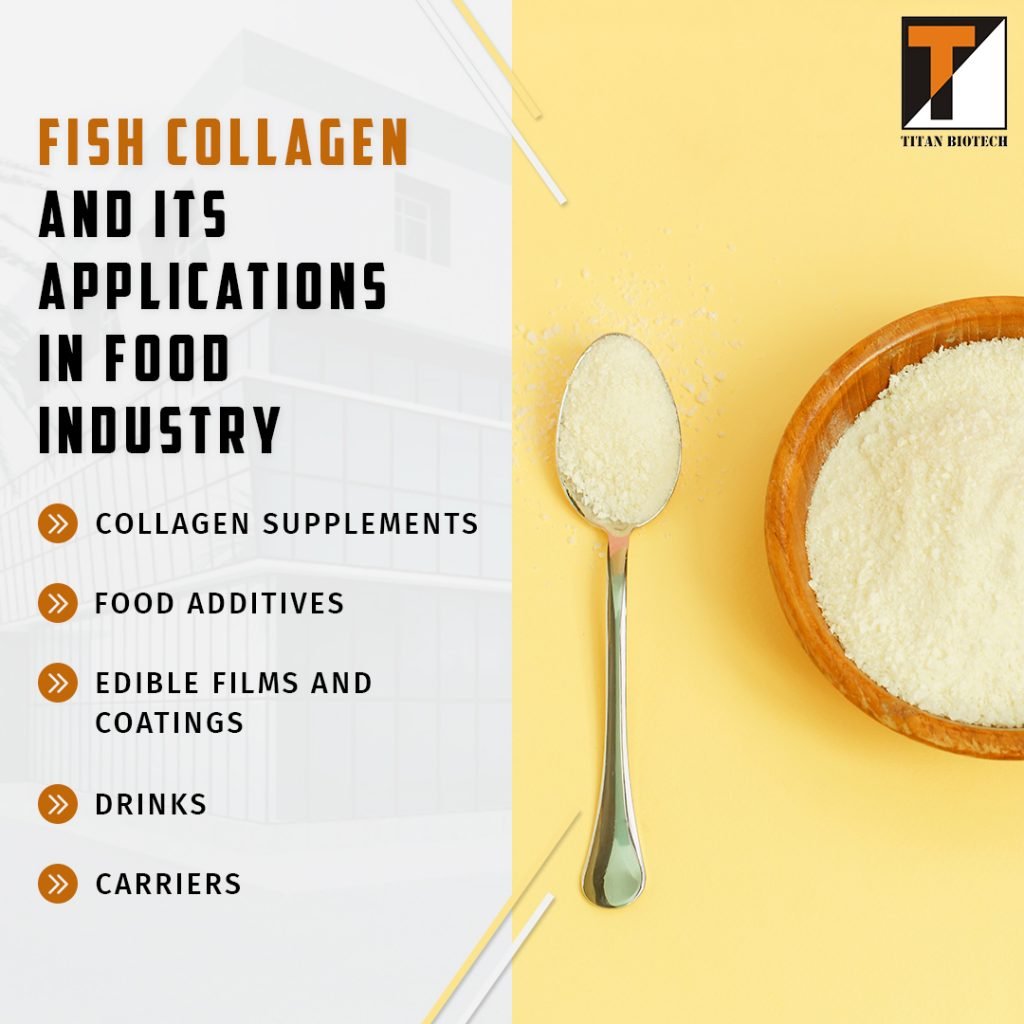Due to the positive impact recorded in the hair care, skincare, and food industry, the fish collagen peptides market has gained popularity over recent years. Fish collagen mainly comes from a fish’s skin, fins, scales, and bones.
Table of Content
- What is Fish Collagen?
- Fish Collagen Application in Food Industry
- Why Choose Titagen – Fish Collagen Peptides for Your Product?
- Conclusion
- Frequently Asked Questions (FAQs)
What is Fish Collagen?

Fish collagen, a high source of bioactive compounds, is primarily used in the food industry. Fish collagen is unique compared to other types of collagen because it has a small particle size, making it easier to enter the bloodstream.
Fish Collagen Application in Food Industry

There are numerous ways fish collagen uses are observed in the food industry.
-
Food Additive
Due to its high nutritional value and multiple health benefits, collagen from fish is an essential ingredient that is used mainly in the food industry. In food product manufacturing, collagen is used because it increases the products’ consistency, stability, and elasticity.
The raw material that includes meat is often added with collagen so it can enhance its technological and rhetorical properties.
Additionally, it is suggested that heat-treated collagen fiber has a promising potential for use as an emulsifier in the food industry, particularly in acidic products.
-
Drinks
Collagen-infused water is currently taking the market by storm. These drinks promise to provide healthy skin, nails, and strong joints and promote hair growth. You’ll find it available in the market in many flavors.
Liquid collagen also helps promote the body’s natural tendency to generate fatty tissues.
Collagen water contains about 10 grams of collagen per bottle, so many prefer to use it as a hydration drink after a heavy workout session. The glass also claims to promote collagen-making in your body, reducing sagging or wrinkles.
-
Edible Films And Coatings
One of the many fish collagen benefits is that it can be made into edible collagen films and coatings. Edible coatings are primarily used in thin layers to lessen moisture, oxygen, and loss or gain of new flavors in the packaging.
Collagen films are not in the market to replace non-edible packaging; it is instead used to provide firm protection against insects, oxidation, micro-organisms, and other factors that might ruin the quality and shelf life of the product.
-
Carriers
During the delivery of substances like antimicrobials, antioxidants, flavors, and colors, collagen is used as a carrier in the form of films or coatings. For instance, in the processed meat industry, fish collagen type functions as a carrier of rosemary extract.
-
Collagen Supplements
Collagen supplements are usually safe to consume and can be taken on a daily basis. As we grow older, our body starts producing less collagen resulting in weak joints, loose skin, wrinkles, and other symptoms. Once you start taking collagen supplements, these symptoms begin to get better. The accessories are available in the market as pills, liquids, and various food products. Fish collagen supplements are more easily absorbed in our bodies than other types of collagen.
Many brands have come forward with an edible health marine collagen product line. In sports medicine, fish collagen has high demand because it encourages muscle gain and lessens the recovery time of an injured player.
However, before taking collagen, ensure you know fish peptides’ side effects, such as fatigue, bone pain, nausea, and heartburn.
Why Choose Titagen – Fish Collagen Peptides for Your Product?
There are several reasons why you should choose Titagen fish collagen peptides for your products:
-
High Quality
Titagen fish collagen peptides are made from premium-grade fish sources and are processed under strict quality control standards, ensuring that the product is safe and effective.
-
Bioavailability
Fish collagen peptides have been shown to have higher bioavailability than other types of collagen, meaning that they are more easily absorbed by the body.
-
Versatility
Fish collagen peptides can be used in a wide range of products, including dietary supplements, nutraceuticals, and functional foods, making them a versatile ingredient for your products.
-
Health Benefits
Fish collagen peptides have been shown to have a wide range of health benefits, including supporting healthy skin, hair, and nails, and helping to reduce joint pain and inflammation.
-
Sustainable
Fish collagen peptides are a sustainable source of collagen as it is derived from fish skins and scales which are by-products of the fish industry, using these by-products ensures that it is a sustainable source of collagen.
-
Customizable
We offer various grades of fish collagen peptides to suit different applications and can also customize the product to meet your specific requirements.
-
Support
Our dedicated team of experts is available to provide support and guidance to help you choose the right product and ensure that it meets your specific needs.
By choosing Titagen fish collagen peptides, you can be confident that you are getting a high-quality, versatile, and sustainable ingredient that will help to enhance the health benefits of your products.
Conclusion
Here we have discussed how collagen has become an essential ingredient in today’s food industry. Besides being applied in foods, drinks, carriers, and edible coatings, the tripeptide fish collagen benefits include curing osteoarthritis, aged skin, and brittle nails and providing muscle strength.
However, before involving collagen supplements, know about your food allergies. If your end user is allergic to shellfish, then involving collagen products harvested from fish or shellfish might not be the safest option. This collagen can also raise your calcium levels which can cause hypercalcemia.
Frequently Asked Questions (FAQs)
How can I increase my marine collagen intake naturally?
Fish and shellfish are good sources of marine collagen. In order to increase your intake of marine collagen, you must start eating fish skins, heads, eyeballs, and scales.
How is fish collagen extracted?
In two ways, fish collagen gets extracted. One is the acetic acid technique, and another is the enzymatic or pepsin technique.
Does fish have collagen?
Yes. Collagen from fish can be found in fish skin, scales, heads, ligaments, and bones. Most of the collagen is usually stored in the skin.
What is fish collagen good for?
There are countless fish collagen uses. It can heal scars, build muscle, reduce wrinkles, stabilize blood sugar levels, decrease cellulite, enhance skin hydration and elasticity, reduce puffiness of eyes, and help strengthen your hair.
Does tuna have collagen?
Yes, it does. Collagen-containing foods include tuna, salmon, cod, and mackerel. Tuna is rich in amino acids, critical components in collagen production.
Which fish is high in collagen?
Collagen is present in almost all kinds of fish, although the level of collagen varies depending on its type. Fishes like Tilapia, codfish, pangasius, and salmon are great sources as they contain high levels of fish collagen.
Does fish oil have collagen?
While fish oil and collagen are both used as health supplements, the two are entirely different things. Fish oil derives from fish tissue, and fish collagen comes from fish skin. The two of them do not have any similarities whatsoever.
What is fish collagen peptide?
Fish collagen peptide, also widely regarded as marine collagen peptide, is created from type I collagen. Characterized by amino acid composition, proline, hydroxyproline, and glycine, the peptide has an increased demand in the pharmaceutical and cosmetic industry. The peptides are primarily created from the skin and bones of saltwater fish.
Sources:
- www.ecronicon.com/ecnu/pdf/ECNU-13-00529.pdf
- www.ifrj.upm.edu.my/22%20(01)%202015/(1).pdf
- www.semanticscholar.org/paper/Fish-Collagen-and-its-Applications-in-Food-and-%3A-A-Raman-Gopakumar/198de396a5871b5ec5f71e604cf67c434aa9f57e

